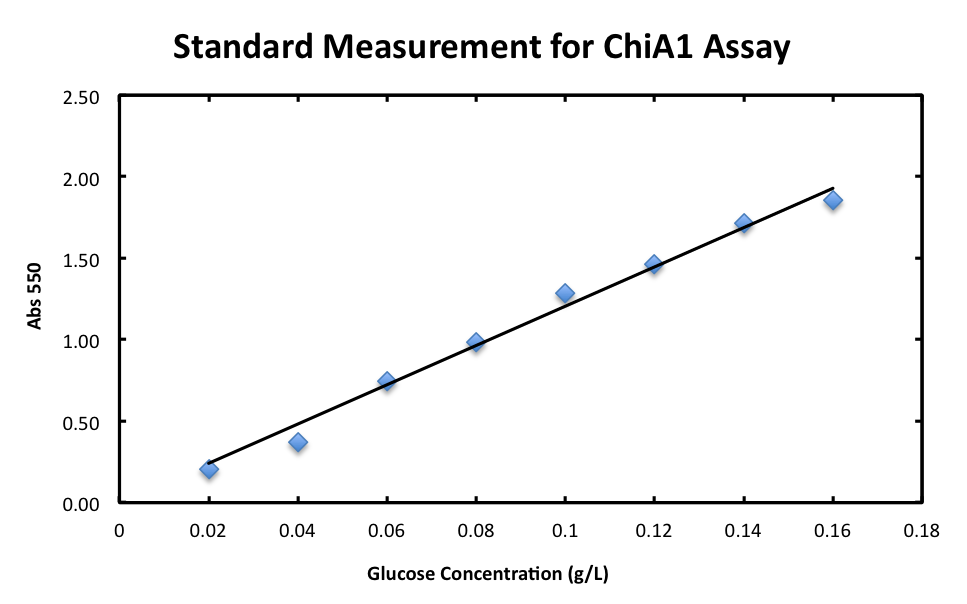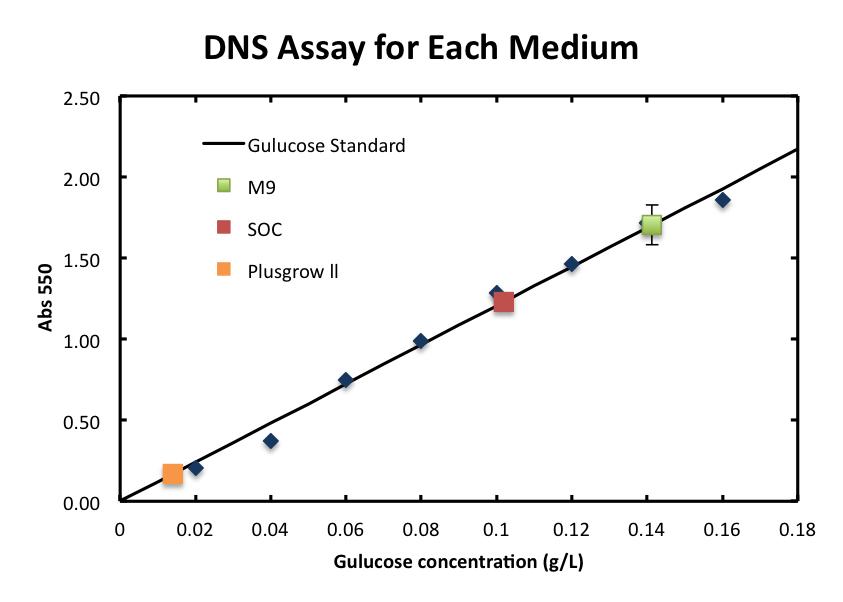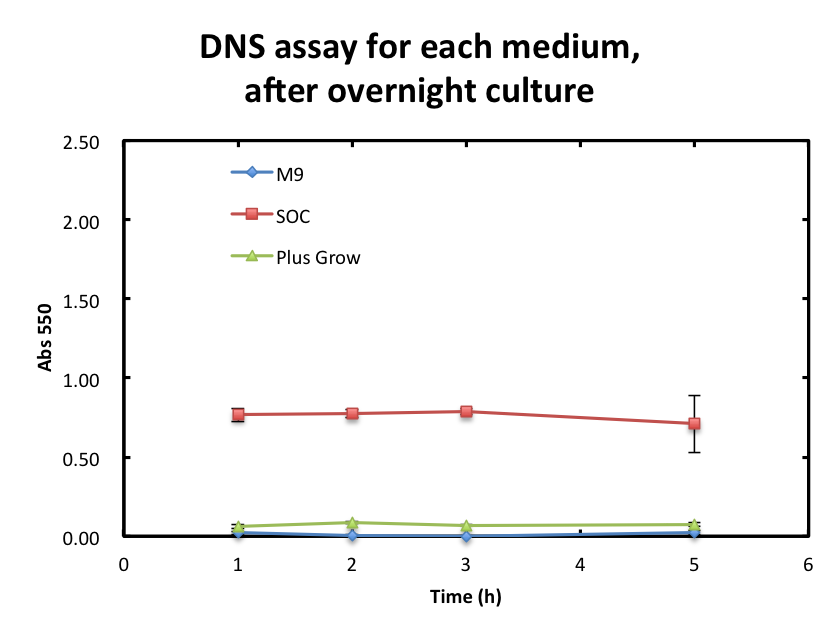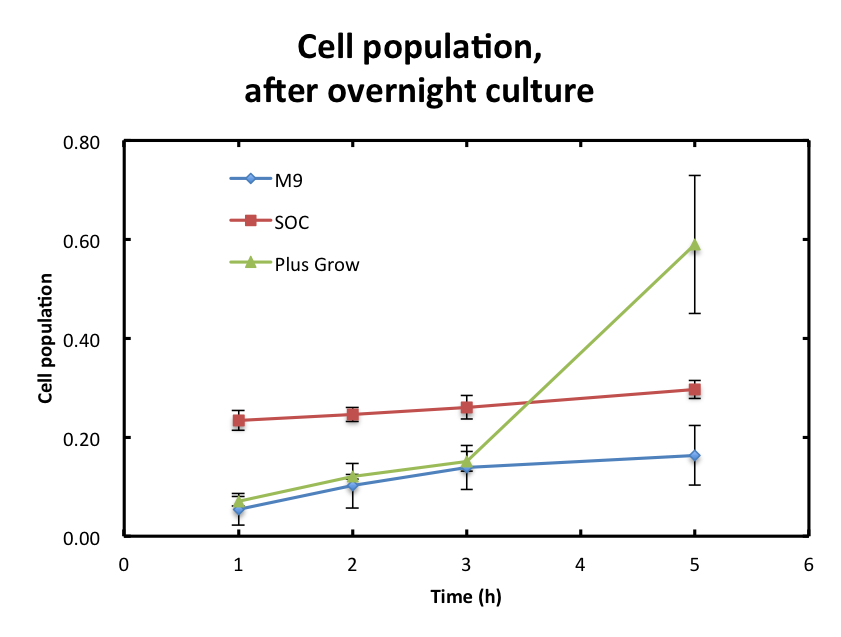Team:Kyoto/Digestion/DNS method
From 2011.igem.org
Contents |
3,5-dinitorosalicylic acid assay(DNS method)
This assay is based on this fact: 3,5-dinitorosalicylic acid (DNS) is changed into 3-amino- 5-nitorosalicylic acid by reducing saccharide in reaction solution and the absorbance of this liquid increase in direct proportion to the amount of reducing sugar.

To carry out this assay, we will be required following two things, that is,
- the relationsip to reducing sugar concntration and absorbance 550
- the assesment of effect of E.coli in media
Introduction
Streptomyces is a kind of prokaryotic bacteria which decompose bodies in nature. We extract protease and chitinase genes from this bacterium and introduce into Escherichia coli. Secretion-signal sequences are included in these genes so that the proteins coded by them will go out without occurring cell lysis. After assembling all genes, we examined the activity of these two enzymes in both of qualitative and quantitative ways.
Method
Construction
We created following constructions to allow secretion of Serine protease, SAM-P20 and chitinase, chiA1. These genes are regulated by lactose promoter, BBa_R0011. We used Streptmyces’s RBS into these constructions, because reference article [1] used them to allow E.coli to secrete these proteins.
Assay
- 3,5-Dinitrosalicylic acid assay (DNS method)
Procedure
DNS method We examined the quantitative relation between absorbance and the volume of sugar and then expressed it onto a straight line graph (result fig 1:リンク).
We led E.coli introduced chitinase gene had secreted disassemble chitin into N-acetylglucosamine and other sugar derivatives in water. After passing enough time (_min), we added this liquid 0.2 ml into DNS reagent 0.6 ml (How to prepare) and boiled this solution for 5 min. After cooling this soluion, We diluted with water to 5 ml and assay the absorbance in 550 nm.
The results of this measurement and the fig 1 graph enabled us to calculate the amount of digested chitin, showing the relative activity of chitinase.
preliminary experiments
1-1:evaluate the affection of medium
we examined the interruption based on the components of media(SOC, plas-grow and M9)
Sample media(with antibiotic)
Blank distilled water
Reagent DNS
・added 240㎕ DNS reagent to 80㎕sample
・ heated it for 5 min in boiling water and then cooled it in water.
・added it distilled water by 2ml
・measured absorbance in 550nm
1-2:measurement the effect of remainded E.coli
・poured the medium cultured E.coli overnight 1.2 ㎕ into each five microcentritube.
・centrifuged them for 5 min at 5,000 rpm
・prepared new five microcentritube and move 800㎕ the supernatants into each of them.
・measure the OD550 of one tube(use fresh medium as a blank in following assays)
・one hour after, we measured OD 550 of other tube
・take 80㎕ supernatant and move it into new tube and then heated it for 3 min in boiling water and then cooled it in water.
・added240㎕DNS reagent and heated it for 3 min in boiling water and then cooled it in water.
・two, three, five hours after, we did above operation, taking supernatant, measured OD500, heating and cooling, applying DNS reagent and heating and cooling again.
・added all sample tube (containing 320㎕ solution) distilled water by 2ml and measure the absorbance of them in 550nm.
Result
Chitinase A1
1. Standard Measurement for ChiA1.
- From the result, a strong correlation between glucose concentration and its A550 was observed.
2. Consideration of medium and growth of E.coli.
Discussion
Reference
[1]Complete genome sequence and comparative analysis of the industrial microorganism Streptomyces avermitilis
[2]Genome sequence of an industrial microorganism Streptomyces avermitilis: deducing the ability of producing secondary metabolites
[3]還元糖の定量法 (生物化学実験法)福井 作蔵
[4]Quantitative Analysis of Cellulose-Reducing Ends
 "
"











